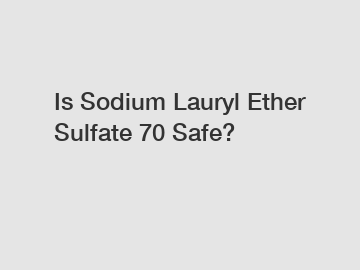Is Sodium Lauryl Ether Sulfate 70 Safe?
Is Sodium Lauryl Ether Sulfate 70 Safe?
Sodium Lauryl Ether Sulfate 70 (SLES 70) is a widely used surfactant in various personal care and household products. It is known for its foaming and cleaning properties, making it a common ingredient in shampoos, body washes, soaps, and detergents. However, there is ongoing debate about the safety of SLES 70 and its potential health effects. In this article, we will explore the safety of Sodium Lauryl Ether Sulfate 70 and any potential concerns associated with its use.
What is Sodium Lauryl Ether Sulfate 70?

Sodium Lauryl Ether Sulfate 70 is a synthetic surfactant derived from coconut oil and ethylene oxide. It is commonly used as a foaming agent and emulsifier in personal care products due to its ability to create a rich lather and effectively remove dirt and oil from the skin and hair. SLES 70 is considered milder and less irritating than its counterpart, Sodium Lauryl Sulfate (SLS), making it a popular choice for formulators looking to create gentler products.
Safety Concerns and Controversies.
Despite its widespread use, Sodium Lauryl Ether Sulfate 70 has come under scrutiny for potential health risks. One of the main concerns is its ability to irritate the skin and eyes, especially in high concentrations. Some individuals may experience dryness, redness, or itching after prolonged exposure to products containing SLES 70. In rare cases, it may cause contact dermatitis or allergic reactions in sensitive individuals.
Another controversial aspect of SLES 70 is its production process, which involves the use of ethylene oxide, a known carcinogen. While SLES 70 itself is not considered carcinogenic, there are concerns about the potential presence of impurities such as 1,4-dioxane, a byproduct of ethoxylation that has been linked to cancer in animal studies. To mitigate this risk, manufacturers are required to use purification processes to remove any traces of 1,4-dioxane from the final product.
Regulatory Approval and Safety Measures.
Sodium Lauryl Ether Sulfate 70 is regulated by government agencies such as the Food and Drug Administration (FDA) and the Cosmetic Ingredient Review (CIR) panel to ensure its safety for consumer use. It is generally recognized as safe when used in accordance with established guidelines and within permissible limits. Formulators are advised to follow safety precautions, such as using appropriate concentrations and incorporating skin conditioning agents to minimize potential irritation.
Consumers can also take steps to reduce their exposure to SLES 70 by reading product labels and choosing products that contain lower concentrations of the ingredient. Opting for natural or organic alternatives may also help reduce the risk of potential skin sensitivities and allergic reactions associated with synthetic surfactants.
Conclusion.
In conclusion, Sodium Lauryl Ether Sulfate 70 is considered safe for use in personal care and household products when used responsibly and in accordance with regulatory guidelines. While there are concerns about its potential to irritate the skin and environmental impact, SLES 70 is generally regarded as a mild and effective surfactant with a long history of safe use. As with any ingredient, it is important to use products containing SLES 70 as directed and discontinue use if any adverse reactions occur.
If you have any further questions or concerns about the safety of Sodium Lauryl Ether Sulfate 70, please feel free to contact us for more information.
Keywords: contact us.
Are you interested in learning more about Shijiazhuang Yuhe New Environmental Protection Technology Co., Ltd., Shijiazhuang Yuhe New Environmental Protection Technology Co., Ltd., Shijiazhuang Yuhe New Environmental Protection Technology Co., Ltd.? Contact us today to secure an expert consultation!

Comments
0